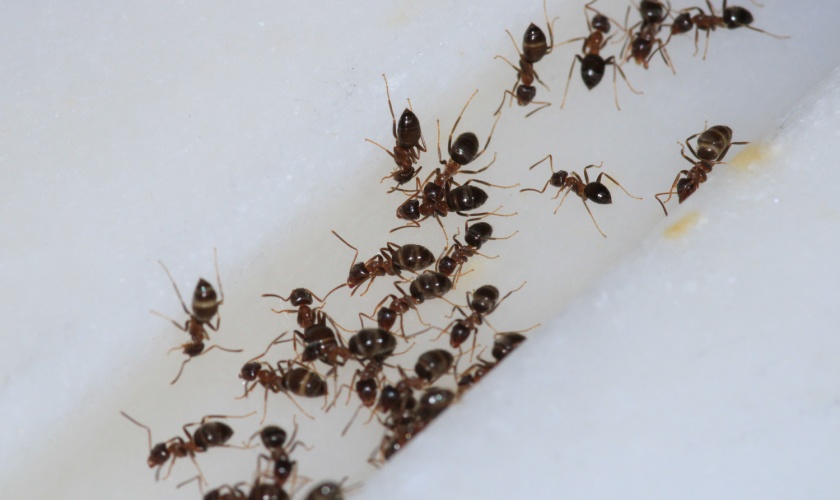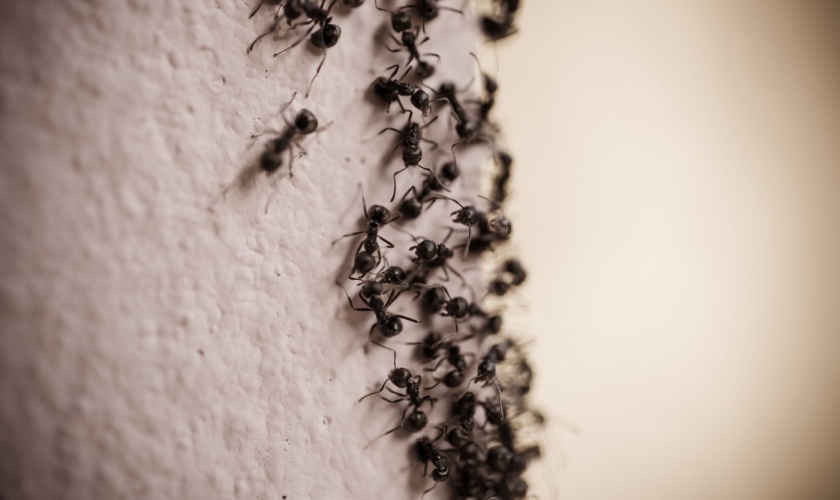In Garner, NC, ants are among the most common household pests. The region’s warm climate and suburban setting provide ideal conditions for several species of ants, each with its own habits, appearance, and challenges. Recognizing the ants you’re dealing with is the first step toward effective control. This guide will introduce you to the most prevalent ant species in Garner and offer tips on how to identify them.
1. Argentine Ants
Argentine ants are among the most common ant species found in Garner. They are small, light- to dark-brown in color, and tend to form massive colonies with multiple queens. These ants are often seen in long trails as they move between food sources and their nests. Argentine ants are particularly attracted to sugary substances and can quickly invade kitchens, pantries, and outdoor areas. Their large colony sizes make them challenging to control, as killing visible workers won’t eliminate the entire colony.
2. Odorous House Ants
Named for the strong, unpleasant odor they release when crushed, odorous house ants are another frequent visitor to Garner homes. These ants are small and dark brown to black, with unevenly shaped bodies. They’re known for nesting indoors near moisture sources, such as under sinks, behind appliances, and inside wall voids. Odorous house ants are highly attracted to sweets and can form long trails to food sources. Their rapid reproduction and hidden nesting sites make them a persistent nuisance.
3. Carpenter Ants
Larger than most other ant species in Garner, carpenter ants are typically black or reddish-black. Unlike termites, they do not eat wood but excavate it to create their nests. This can cause structural damage if left unchecked. Carpenter ants prefer damp or decaying wood and are often found in wall voids, window frames, or wooden furniture. Homeowners may notice piles of wood shavings near their nesting sites, along with faint rustling sounds inside walls. Their size and wood-damaging habits make them a more serious concern than smaller nuisance ants.
4. Pavement Ants
Pavement ants get their name from their habit of nesting under sidewalks, driveways, and building foundations. These ants are small, dark brown to black, and are often seen forming trails along pavement cracks and entry points into homes. Pavement ants feed on a wide variety of foods, including sweets, grease, and proteins. While they are not as destructive as carpenter ants, they can become a recurring nuisance if their nesting sites are not properly treated.
5. Fire Ants
Though less common than the other species mentioned, fire ants can still pose a threat in Garner. These reddish-brown ants are known for their painful stings and aggressive behavior. Fire ants build distinctive mounds in sunny, open areas, such as lawns, gardens, and along sidewalks. Disturbing their nest can lead to multiple stings, which may cause allergic reactions in sensitive individuals. Their presence is more of a concern outdoors, but fire ants can occasionally find their way indoors in search of food or water.
How to Identify the Ants in Your Home
Accurate identification is essential for effective ant control. To determine which type of ant you’re dealing with, consider the following:
- Size and Color: Ant species vary in size and color. Carpenter ants are much larger than odorous house ants or Argentine ants, while fire ants have a distinct reddish-brown color.
- Nesting Habits: Where you find the ants can help identify them. Carpenter ants often nest in wood, odorous house ants prefer moist indoor locations, and pavement ants typically nest outdoors under concrete.
- Food Preferences: Different ants are drawn to different types of food. Odorous house ants favor sweets, pavement ants eat both sweets and proteins, and Argentine ants are highly attracted to sugary substances.
- Behavior and Trails: The way ants move and form trails can also be a clue. Argentine ants often form long, consistent trails, while fire ants are more likely to swarm aggressively if their nest is disturbed.
Garner, NC, is home to several ant species, each with its own characteristics and challenges. By learning to identify these ants based on their appearance, nesting habits, and behavior, you can take more effective steps to control them. For stubborn or widespread infestations, consulting a local pest control expert can help ensure the problem is handled quickly and efficiently, protecting your home from unwanted ant invasions.

